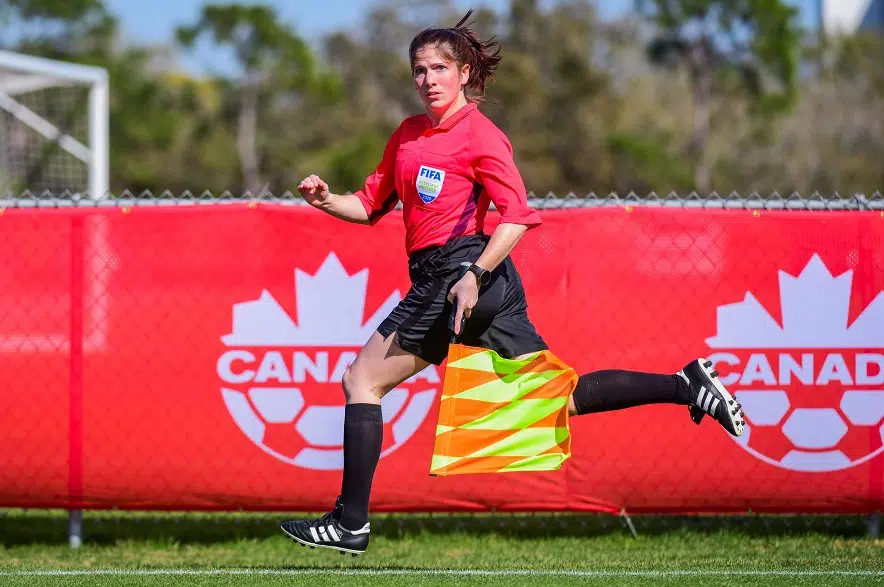Despite Canada’s national soccer team not featuring anyone from Saskatchewan on its 2023 Women’s World Cup roster, the province will still be represented on the pitch.
Chantal Boudreau from Regina will be one of five Canadian officials serving at the 2023 Women’s World Cup in Australia and New Zealand.
This will be Boudreau’s second World Cup as an official – her first was in 2019 when the tournament was held in France.
Boudreau said she began officiating soccer in 2010 as a 21-year-old university student, using it as a way to make extra money in order to help pay for her schooling. But now, that experience has led her to a full-time job officiating.
While she started officiating as a way to make extra money, she said opportunities kept coming up allowing her to advance her craft and get to where she is today.
“I was very lucky growing up when I decided to become an official,” Boudreau stated. “I was just doing it for fun, and I would (use the money) to pay for university. But, all of a sudden, I had the right instructors and all the guys and gals from the Saskatchewan Soccer Association who pushed me and said I could go higher than just in the Saskatchewan Soccer Association.”
Boudreau paid her dues and officiated various levels of the game throughout Regina and Saskatchewan. Once she finished school, she worked as a financial administrator for a plumbing company in Regina. But after finishing school and working for a little bit, doors kept opening for her in the officiating world.
Because of the opportunities that presented themselves to her, she was convinced to leave Regina and move to Stoney Creek, Ont. in 2017. There, she found more opportunities to officiate higher levels of soccer and make travelling out of Toronto a lot less expensive than trying to find a flight out of Saskatchewan.
Her goal after moving away from Regina was to one day officiate in a Women’s World Cup and the Olympics, she said.
During her first year in Ontario, she worked part time as a server and an accountant online while officiating. After her first year in that province, she decided to drop the part-time jobs and became a full-time official in 2018.
Since then, Boudreau said she’s getting a lot of different opportunities.
“I’m doing (work in) the CPL, MLS, anything within CONCACAF and FIFA. I typically do between 40 and 50 games a year,” Boudreau stated.
The move to Ontario seems to have paid off, as she’s had the opportunity to officiate games throughout North America and the world. She said she was given the opportunity to officiate the 2019 Women’s World Cup in France, and was also invited to be an official at the 2020 Tokyo Olympics.
When she’s on the pitch, Boudreau works as an assistant referee. Essentially, she’s the person who carries the flag on the sidelines.
While being a referee is a tough job and comes with lots of criticism, she said she really embraces the role, including when she is getting booed by fans.
“I love being an assistant referee. Between the players and fans, it’s one of the best things,” Boudreau said.
“I was doing U.S.A. versus Brazil, and Megan Rapinoe scored, and I had my offside flag in the air. Everyone was cheering, and then when they realized it wasn’t a goal anymore, there was 25,000 people booing,” she explained.
“I was just standing there with my little stick in the air like, ‘I know I’m right,’ and it was so surreal. As an athlete, you want all the accolades of the cheering, and I’m sitting there going like, ‘I enjoy the booing. It’s kind of fun.’”
According to Boudreau, the biggest reason why she’s got to where she has is because of her willingness to learn.
“I think that was probably the best thing I got from coming out of a small province. We didn’t necessarily have the biggest opportunities,” she stated.
“When someone took interest in me, all I wanted to do was learn from them. You have to be humble and eager to take on those opportunities and be eager to learn.”
Boudreau said the officials won’t find out their assignments until closer to the start of the tournament.
“Our home base is going to be in Sydney. We typically find out our assignments 48 hours in advance. We won’t know about our assignments until we get there, and we’re hoping for the best and want as many assignments as possible,” she said.
For the first time in 2023, the Women’s World Cup will be expanded to include 32 teams, up from 24 in 2019.
That means players from all around the world will play, and many different languages will be spoken.
While English is mostly the universal language spoken on the pitch, Boudreau said she’s not too concerned about possible language barriers between teams.
“We do train a lot to work with our bodies, eyes and movement of hands to make sure we do get a point across and that the players do understand us,” she explained. “Even if a player doesn’t understand, our faces tell exactly what the story is.”
Boudreau added she knows some French, Spanish and German which should help her communicate with players.
In 2019, her parents were in the stands to watch her make her Women’s World Cup debut, but they won’t be making the trip to Australia and New Zealand to watch her officiate after her father passed away on Christmas Day of 2022.
She said she’ll be dedicating her first game of the tournament to her parents. Before her father passed, Boudreau says that she was able to tell him the news on Christmas Eve that she’d be officiating in the 2023 Women’s World Cup.







